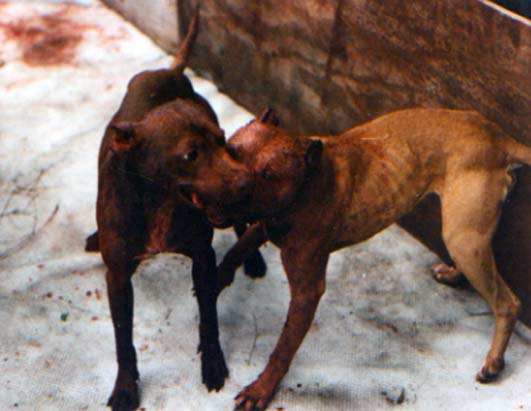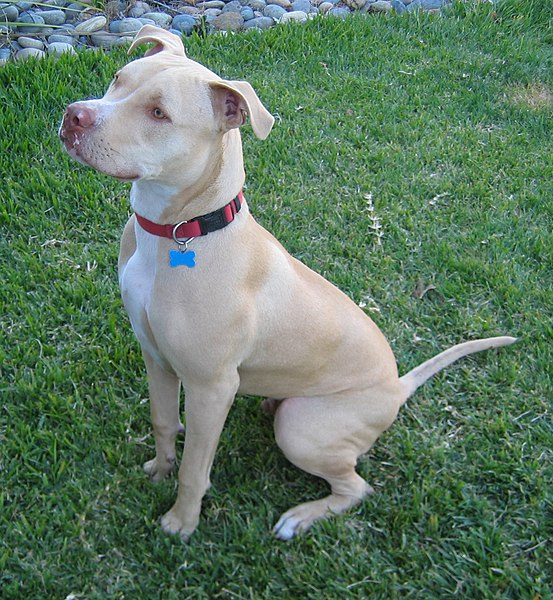Pitting animals against each other has been around since the dawn of man. It probably started when one man said, "dude, let's start placing bets on what ram's gonna butt the other harder" or some such similar wager. Soon this evolved into putting domesticated animals against each other in high-stakes matches. Modern examples include monkey fighting, various types of bug-fighting and cockfighting.
Oh, and dog fighting. Can't forget that.

The American Pit Bull Terrier has become the Western world's poster child for dog fighting. Although the title says "American," the founding stock is from the United Kingdom. The term "pit bull" can technically vary in meaning depending on the area, ranging from the APBT to any dog in the molosser group. For now, we will be discussing only the APBT, which is most easily identified by its bigger-than-average head.
In its early stages, the pit bull breed was used in bull- and bear-baiting. "Baiting" of these animals consisted of many dogs ganging up on the larger, enraged beast, which was usually tied to a pole just to be sure the dogs would win. After these sports were effectively outlawed, rat baiting and dog fighting became more popular, resulting in the pit bull we see today. Pit bulls have also been historically used for herding and delivering messages in both World Wars, and can be fine, loyal, perfectly gentle family pets.
Pit bulls, even mixes, have a reputation for being vicious. After their popularity as pets declined, their reputation as fighting dogs skyrocketed. This is not entirely unjustified; pit bulls and pit bull mixes take home the dubious award of having the most dog attacks to their name (and this year isn't over!). If pitties scored higher than Golden Retrievers on temperament tests, we sure don't want to get in the way of a Golden.
This does not mean that they are bad dogs.

I have met pure pit bulls. They act just like every other puppy as puppies. Even the adult pits I have met were not bad dogs. As per Wikipedia, fighting dogs are bred to be gentle around humans, but vicious towards other animals - emphasis on "gentle around humans." This more or less coincides with my own experiences with pits and pit mixes.
Alas, it's not that simple. Pit bulls were bred to fight, and, although it is fine if you do not raise yours to fight, realize that some people buy pit bulls because they were bred to fight. For example: The one pit bull I did see with a full butcher shop was owned by a guy sporting tattoos and piercings. I am not saying that he was a professional dog fighter or anything, but he certainly wanted to look tough. (I have also heard that some people refuse to neuter their pets because it feels like they are castrating themselves.) The owners of (pure) pit bulls may well be looking for tough dogs, whether they intend to fight them or not.
This coincides with "there are no bad dogs, only bad owners." Pit bulls used to be perfectly fine to keep as pets, but after their popularity declined, they became seen as fighters more than lovers. The reputation that pit bulls currently have is enough to make one worry around them - especially if one sees a pitty with his junk still in tact (there are a number of rather unsavory explanations for that). It's not that the dogs themselves are bad, but one must wonder what the owners intend for them.
Banning will not stop anything that supposedly comes with pit bulls. There will always be blood sports, no matter what legislation you make. There will always be people using their dogs to prove that they, as people, are superior. Even if pit bulls were banned, chances are that things like Rottweilers would become their replacement as a "tough dog" with aaaalllll the strings attached.
Well, Rottweilers...or Thursday's furry freak.
Oh, and dog fighting. Can't forget that.

The American Pit Bull Terrier has become the Western world's poster child for dog fighting. Although the title says "American," the founding stock is from the United Kingdom. The term "pit bull" can technically vary in meaning depending on the area, ranging from the APBT to any dog in the molosser group. For now, we will be discussing only the APBT, which is most easily identified by its bigger-than-average head.
 |
| My head's not big! |
In its early stages, the pit bull breed was used in bull- and bear-baiting. "Baiting" of these animals consisted of many dogs ganging up on the larger, enraged beast, which was usually tied to a pole just to be sure the dogs would win. After these sports were effectively outlawed, rat baiting and dog fighting became more popular, resulting in the pit bull we see today. Pit bulls have also been historically used for herding and delivering messages in both World Wars, and can be fine, loyal, perfectly gentle family pets.
Pit bulls, even mixes, have a reputation for being vicious. After their popularity as pets declined, their reputation as fighting dogs skyrocketed. This is not entirely unjustified; pit bulls and pit bull mixes take home the dubious award of having the most dog attacks to their name (and this year isn't over!). If pitties scored higher than Golden Retrievers on temperament tests, we sure don't want to get in the way of a Golden.
This does not mean that they are bad dogs.

I have met pure pit bulls. They act just like every other puppy as puppies. Even the adult pits I have met were not bad dogs. As per Wikipedia, fighting dogs are bred to be gentle around humans, but vicious towards other animals - emphasis on "gentle around humans." This more or less coincides with my own experiences with pits and pit mixes.
Alas, it's not that simple. Pit bulls were bred to fight, and, although it is fine if you do not raise yours to fight, realize that some people buy pit bulls because they were bred to fight. For example: The one pit bull I did see with a full butcher shop was owned by a guy sporting tattoos and piercings. I am not saying that he was a professional dog fighter or anything, but he certainly wanted to look tough. (I have also heard that some people refuse to neuter their pets because it feels like they are castrating themselves.) The owners of (pure) pit bulls may well be looking for tough dogs, whether they intend to fight them or not.
 |
| Go ahead. TRY and ban this face! |
This coincides with "there are no bad dogs, only bad owners." Pit bulls used to be perfectly fine to keep as pets, but after their popularity declined, they became seen as fighters more than lovers. The reputation that pit bulls currently have is enough to make one worry around them - especially if one sees a pitty with his junk still in tact (there are a number of rather unsavory explanations for that). It's not that the dogs themselves are bad, but one must wonder what the owners intend for them.
Banning will not stop anything that supposedly comes with pit bulls. There will always be blood sports, no matter what legislation you make. There will always be people using their dogs to prove that they, as people, are superior. Even if pit bulls were banned, chances are that things like Rottweilers would become their replacement as a "tough dog" with aaaalllll the strings attached.
Well, Rottweilers...or Thursday's furry freak.

No comments:
Post a Comment